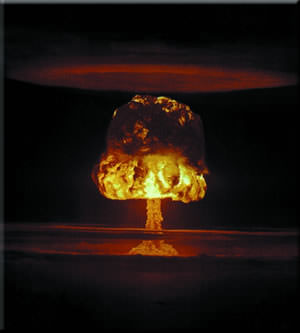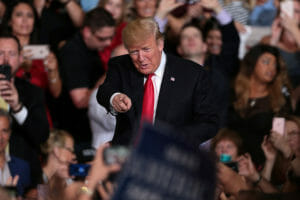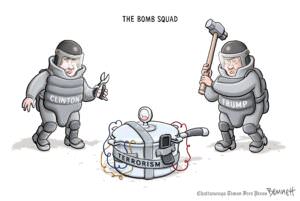America and Iran: Three Nuclear Ironies
The United States is apparently considering the use of nuclear weapons to keep Iran from obtaining nuclear weapons. How can we contemplate nuking people who might nuke people to show that nuking people is wrong? A veteran nuclear weapons expert at Physicians for Social Responsibility unpacks the apocalyptic irony.
Editor’s Note: Tad Daley is a fellow at Physicians for Social Responsibility, and a longtime nuclear analyst and disarmament advocate. This essay also appears in the July/August 2006 issue of Tikkun magazine.
“With supreme irony,” historian James Harvey Robinson said of the First World War, “the war to ‘make the world safe for democracy’ ended by leaving democracy more unsafe….” With comparable irony, a nuclear war to make the world safe from nuclear peril could end by leaving America more exposed to nuclear annihilation than at any time since the dawn of the atomic age.
A NUCLEAR ATTACK ON IRAN?
In the April 17, 2006, issue of The New Yorker magazine, investigative journalist Seymour Hersh revealed that to prevent Iran from acquiring nuclear weapons perhaps five to 10 years from now, Pentagon planners were preparing not just military strikes on that country but nuclear strikes. Some analysts, according to Hersh, insist that only our own tactical nuclear warheads can guarantee the elimination of Tehran’s nascent nuclear capability.
President Bush had the opportunity to disavow Hersh’s stunning charge on April 18 when a reporter asked him directly if his administration was planning a nuclear strike on Iran. His reply? “All options are on the table.” Six weeks later, when Secretary of State Condoleezza Rice announced that Washington was willing to negotiate directly with Tehran if it suspended enrichment and reprocessing of uranium, she was asked whether this meant that any plans to attack Iran had been shelved. Bush, she replied, “was not going to take any of his options off the table.”
Death penalty opponents often display an unanswerable bumper sticker: Why do we kill people who kill people to show that killing people is wrong? Similarly, one might ask: How can we contemplate nuking people who might nuke people to show that nuking people is wrong? The United States is apparently considering the use of nuclear weapons to keep another state from obtaining nuclear weapons. A Western state appears prepared to employ the nuclear weapon to stop a Muslim state from even seeking the nuclear weapon.
Witness the full depth of the irony here. It’s an irony so towering, so obvious and so unsubtle, that — if it happens — surely not a single member of the world’s Islamic community will fail to take notice.
THE NUCLEAR NONPROLIFERATION TREATY: THEIR OBLIGATIONS AND OURS
Perhaps because the Bush administration displays such unconcealed disdain for international law, few since the Hersh story broke have mentioned that a U.S. nuclear strike on Iran would explicitly violate the regime of the Nuclear Non-Proliferation Treaty (NPT). The grand bargain of the NPT, of course, is that the 183 nonnuclear signatories agreed never to produce or acquire nuclear weapons, in exchange for a promise from the five nuclear signatories eventually to get rid of theirs.
But the NPT regime also contains a number of other, smaller mutual pledges. When the treaty was originally negotiated in the 1960s, the nonnuclear states demanded — in return for their promise to remain nonnuclear — that the nuclear states promise never to attack them or threaten them with nuclear weapons. This, former U.S. Secretary of Defense Robert McNamara and former U.S. arms control official Thomas Graham have observed, “could be the most reasonable request in the history of international relations.”
The nuclear states refused, prostrating themselves before the altar of “military flexibility.” But 25 years later, at the NPT review conference in 1995, they finally declared their willingness to adhere to such a promise (with a slight caveat regarding retaliation against nonnuclear states aiding and abetting an attack by a nuclear state). Why? Because they were forced to do so in order to indefinitely extend the life of the treaty, which was set to expire that year.
Three years ago, the United States defied the United Nations to show Saddam Hussein that he could not get away with defying the United Nations. Now, the Bush administration is apparently prepared to breach the NPT to show Mahmoud Ahmadinejad that he cannot get away with breaching the NPT.
Count that as nuclear irony number two.
NUCLEAR DOCTRINES AND NUCLEAR CONSEQUENCES
To those who have been paying attention to the Bush administration’s pronouncements on nuclear policy since 2001, Hersh’s revelations come as little surprise. During its first term, the Bush administration codified a new nuclear doctrine that identified several specific scenarios in which the United States would consciously choose to initiate nuclear war. The 2002 “Nuclear Posture Review,” almost wholly unnoticed by the peace and progressive communities, put forth explicit plans for launching nuclear attacks against nonnuclear nations. It even named seven states — including Iran — as possible targets of a U.S. nuclear first strike.
Moreover, the administration intends to both retain and improve the U.S. nuclear arsenal for decades to come. It envisions new ICBMs — our long-range, land-based nuclear missiles that can incinerate entire cities, anywhere in the world, within the hour — coming on line in 2020. It foresees deploying both new nuclear submarines and new submarine-launched ballistic missiles in 2030. It plans to unveil a new intercontinental strategic bomber in 2040. Oh — and freshly designed nuclear warheads for all of them. Just in time for the centennial of Hiroshima and Nagasaki.
To the rest of the world all this is sanctimonious and self-righteous. Around the world, in barracks, bazaars and boulangeries, angry young men ask, “Why can the United States have thousands of nuclear weapons, but our countries can’t have even one?” Some, it must seem to them, both anoint themselves as able to be trusted with nuclear weapons and arrogate to themselves the task of assessing whether others meet their tests. President Bush has often let slip this conceit of cultural superiority. “We owe it to our children,” he said in August 2002, “to free the world from weapons of mass destruction in the hands of those who hate freedom.”
So who will decide? Who will render subjective, ad hoc verdicts on whether certain leaders or certain peoples do not love freedom quite enough to be permitted the nuclear prize? Who will serve as prosecutor, judge, jury and enforcer?
Why, of course, the Freedom Lovers in whose hands nuclear weapons already reside.
In response to the Hersh revelations, Physicians for Social Responsibility (PSR) conducted a study of the potential medical consequences of a nuclear first strike on Iran. PSR has a long history of such analyses after its groundbreaking research published in The New England Journal of Medicine in 1961. Using unclassified software developed by the U.S. Department of Defense, PSR concluded that a U.S. nuclear attack on the Iranian facilities at Isfahan and Natanz would kill 2.6 million people within 48 hours. Soon thereafter, 10.5 million more would be exposed to catastrophic radioactive fallout in Iran, Afghanistan, Pakistan and India. Much of that fallout could make vast areas uninhabitable for decades to come.
If the U.S. actually does roll out a few atomic bombs in the skies over Iran, there will be no turning back for any of us. The taboo that has prevailed since Hiroshima and Nagasaki will prevail no more. The distinction between conventional and nuclear war will forever be lost. The inhibition that has kept everyone from stepping over the nuclear precipice will disappear in a single flash. Once someone throws open the nuclear Pandora’s box that has been so precariously held shut since Aug. 9, 1945, it will never be shut again.
NEW KINDS OF TERRORISTS AND NEW KINDS OF TERROR.
If the United States does cross the nuclear Rubicon, who will be the next to do so? Probably not Iran itself, because it doesn’t have any nuclear weapons yet. Probably not any other state, for that matter, because of the logic of nuclear deterrence.
But that logic doesn’t apply to the non-state nuclear terrorist, whom so many of us have so feared since 9/11. When a loosely affiliated global terror network does not actually control any dirt, deterrence becomes essentially meaningless, because there is no place or thing to threaten to retaliate against. How effective were America’s thousands of bristling nuclear warheads when they came up against 19 determined young men, armed only with box cutters, on 09/11/01? What were we going to do, dispatch a nuclear cruise missile through the window of Mohammed Atta’s bachelor apartment in Coral Springs, Fla.?
Osama bin Laden, in his highly publicized statement in January of this year, claimed that his minions were already “preparing operations” inside the United States. If one actively tried to conjure up a motive for our enemies to take the next step to nuclear terror, it would be hard to come up with something better than a nuclear first strike — on a Muslim country, no less — to perpetuate the nuclear double standard.
The greatest effect of such a first strike might be on those young Muslim men, both inside and outside Iran, who are essentially still on the fence. Who are still contemplating whether to buy themselves a one-way ticket down the dead-end road to jihadi martyrdom. Who have not dedicated their lives, yet, to getting their hands on one of the 30,000 atomic bombs floating around the planet, using it to slaughter all the inhabitants of a major U.S. city, and perhaps causing a panicked American nation — wondering which city might be next — to utterly unravel.
Nothing could do more to provoke a nuclear terror attack on the United States than the use of nuclear weapons by the United States. Some of the military officers now planning the Iran campaign undoubtedly realize this, which must be why some of them, according to Hersh, are considering resigning over the nuclear option. If the United States pursues that option, it would arguably be striking the finest, purest Faustian bargain in all of human history.
We are the ones who created these weapons in the past. We are the ones contemplating the use of these weapons in the present. We are the ones who vaingloriously insist that we — but not others — must perpetually possess these weapons into the future. And now, we are the ones who may soon feel the wrath of these weapons brought down upon ourselves. We are the ones who may be the authors of our own annihilation. We are the ones, perhaps, who will be devoured by our own creation.
In the end, that could turn out to be the greatest irony of all.
Your support matters…Independent journalism is under threat and overshadowed by heavily funded mainstream media.
You can help level the playing field. Become a member.
Your tax-deductible contribution keeps us digging beneath the headlines to give you thought-provoking, investigative reporting and analysis that unearths what's really happening- without compromise.
Give today to support our courageous, independent journalists.





You need to be a supporter to comment.
There are currently no responses to this article.
Be the first to respond.